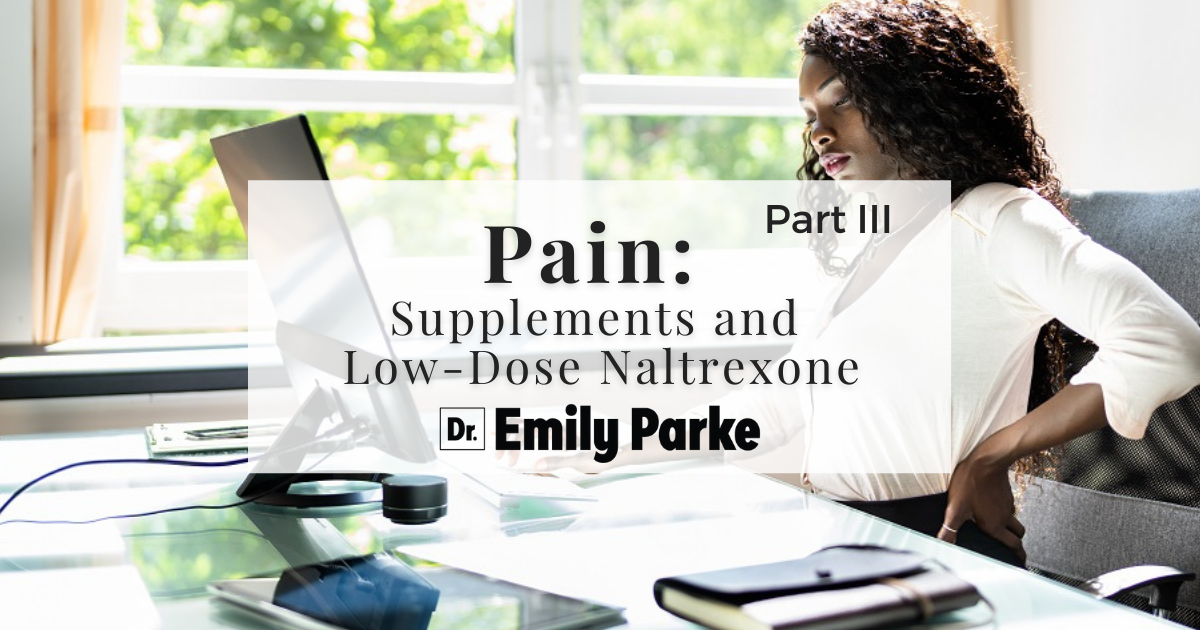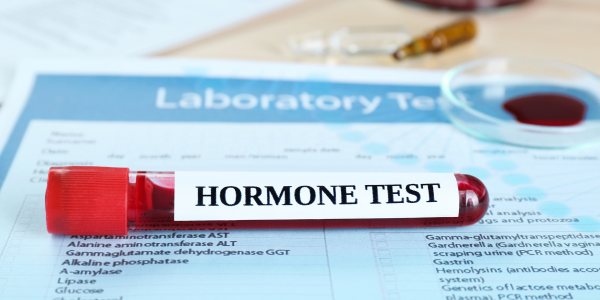

Hi, this is Dr. Emily Parke with your next functional health minute. I’d like to continue on talking about pain management.
In the first two videos I talked about the root causes of pain, and then how to think about how to start doing some changes for yourself, especially with lifestyle and nutrition, sleep, exercise and movement, stress management, toxin reduction, and, of course, getting the physical parts of the pain evaluated as well. Click here to watch Part I and click here to watch Part II.
Now I’d like to kind of talk about what are some key supplements, some key things that you can do to help with pain management. So one of my go-to supplements for any type of pain or inflammation is curcumin. So curcumin is one of the main extracts in turmeric, which is very anti-inflammatory and it’s also immune system modulating. And I find it really, really helpful for all kinds of pain, whether it’s from an inflammatory origin or not.
And so curcumin is one I really like. I also really like magnesium a lot. And there’s different forms of magnesium. I am a big fan lately of having a combination of different magnesiums. I find it kind of hits all the parts really well. But magnesium is…think of it as a master relaxant. So if there’s tight muscles, it can help relax those. It’s been pretty well studied for other things like headaches and whatnot. Obviously, it can help with constipation. It can help with sleep, anxiety. There’s like all kinds of other great reasons to consider supplementing with magnesium.
But then there’s a lot of other things to consider with supplementation for pain. And a lot of them are going to be specific to what your nutrient deficiencies are. And as I mentioned in the previous video, but first you’re going to want to get those levels checked. So I wouldn’t recommend anyone take high doses of anything until they’ve had a full nutrient evaluation.
But, as I mentioned, things like vitamin D deficiency, magnesium deficiency, folate, B-12, et cetera, et cetera, replacing those can be really, really helpful. So if you can’t get those checked or you don’t know where to start, going on a really high quality multivitamin that has the active forms of the nutrients can be really helpful. Because while it might not, going on a multi might not fully cure a deficiency, let’s say, it may prevent the deficiency from at least getting worse until you are able to get a blood test for some of the specific nutrients. So I’m a big fan of taking a multivitamin.
Then, of course, looking at things like omega-3 fish oils. Because we know that fish oil, especially the omega-3 parts, are really helpful for anti-inflammation and that’s the EPA part of it. And then the DHA part of it is really important for brain health. So that’s another one I find to be really helpful.
And then, of course, if there are things, other specific things going on—like obviously if you’ve got autoimmune disease, for example, then, you can consider other outside of the box things, like low dose naltrexone. I’ve written a couple of really great blog articles on that. That can be really helpful. It’s actually a prescription, and it’s a compounded prescription that can really help for pain management of all kinds.
I’ve got a lot of patients on it. It has worked great for autoimmune disease, so pain, if the root cause of pain is autoimmune disease that can be really helpful. But even patients who don’t have any autoimmune disease diagnosis per se, LDN can still be really helpful for them. I’ve got patients with difficult to treat gut problems, SIBO/IMO, MCAS and so on and so forth. So it can be really helpful for multiple things.
And there’s a lot I can keep talking about for nutritional supplements. The key ones are multivitamin, fish oil, magnesium, and curcumin. Those are the top easy ones to start with. But then we can start to get even more specific, depending on what’s going on. If someone really has joint pain, for example, then I might ask them to add boswellia to it. We might add ginger to it, or a combination product that has multiple different things in it.
I might have people use hemp oil that has, of course, organically sourced and CO2 extracted that has a higher concentration of CBD in it. That can be really helpful. You just have to really think about what the root cause of that person’s pain is. But those would be, I think, my key, the key supplements, if you were going to try and experiment on your own. Of course, if you have a health care practitioner, you always want to get their advice on things. And read labels really carefully, making sure you get your supplements from a third party quality sourced resource.
So I hope this really helps you think about what you might experiment with on your own to see if you can make a little bit of headway in your pain management. This is Dr. Emily Parke with today’s functional health minute.
Share:
Dr. Emily Parke
Social Media
Most Popular Posts
Subscribe To Our Newsletter
Related Posts

New Podcast Episode: My journey into functional medicine + what I’ve learned
I’m excited to share that I recently joined DeLo for Episode 165 of the On the DeLo podcast! In this conversation, we explored my journey

Understanding the Essential Labs for Women on Hormone Replacement Therapy (HRT)
So what are the minimum labs we’re looking at when we do hormone replacement therapy? We obviously want to look at an estrogen level, so

How to figure out the right amount of HRT in women
What about checking lab values when you’re on hormone replacement therapy? I do find it to be helpful, but we also want to consider symptoms.

Did you know there’s a difference between food allergies, sensitivities, and intolerances?
Did you know that there’s a difference between food allergies, food sensitivities and food intolerances? Food allergies, the reactions tend to happen pretty immediately and
